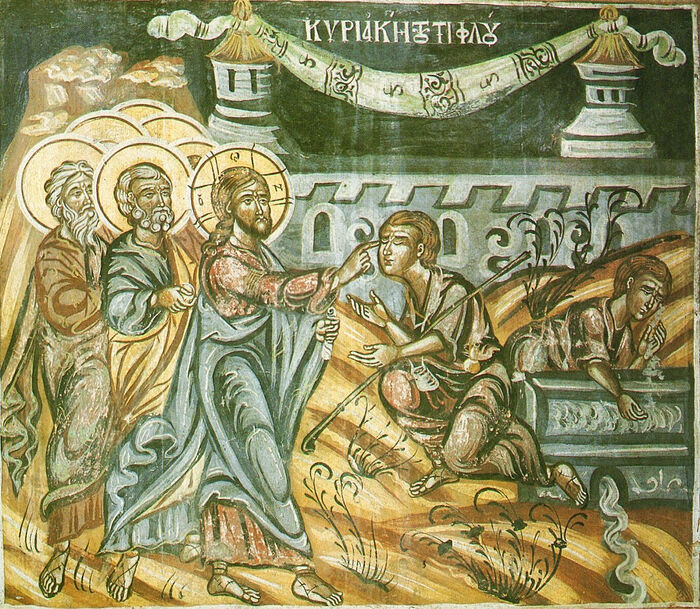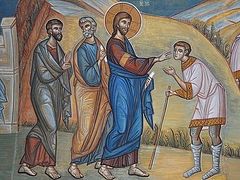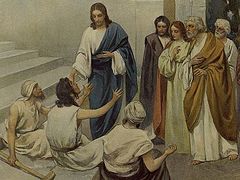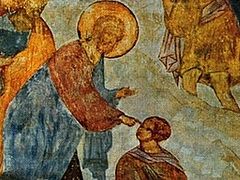Christ is Risen! Teacher, the Apostles asked Christ, who sinned, this man or his parents? Beloved, this is the last Sunday of the Paschal Season. This is the Sunday of the Man Born Blind. The Holy Church through the Sundays of the Paschal Season displayed evidence of the Resurrection through miracles—the miracles confirmed the Resurrection: Thomas’s doubt, transformed into true, living faith; the conquering courage of the Myrhbearing Women who overcame their weak, female nature, and accomplished what brave men cannot, becoming themselves proclaimers of the Resurrection in the process; the paralytic who received mobility and wholeness by His encounter with Christ and the Resurrection; and last Sunday, the Samaritan Woman, a heretic and an adulteress, who, by encountering Christ and being transformed by that mystical encounter into a bold Apostle, witnessed to Samaria. The Samaritans she instructed proclaimed, This is Christ, the Redeemer of the World. And now, this Sunday a man born blind, born without any physical eyes, has the Creator and Fashioner of the First Adam standing before him in the flesh. The God-Man spits on the earth—the substance from which we mortals were taken and fashioned—and He fashions eyes for him, commanding him to wash in the Pool of Siloam. There are many examples of resurrected people in the Gospel—people who were at the edge of despair, of sin, of sickness, or death; and then came their own life-altering encounter with the God-Man Christ. His Resurrection had an impact on them before it even occurred in time, since He Himself is the source of immortality.
We are men and women born blind from birth: blind in our spiritual ignorance, our spiritual inactivity, our fallen nature, and consequently, our passions. The account of Christ’s healing of the Blind Man in the Gospel of John offers us a blueprint of how to obtain healing of our spiritual blindness. Some may be physically blind and living in darkness, yet these unfortunate ones will be called blessed in the world to come and they will see; our physically blind brethren will receive a great award for the suffering they endured here. There, beyond, they will see and grasp everything. Yet what will become of us? Will we see Christ in the future world, and face to face as friends at that? Or, will we be condemned—due to our spiritual insensitivity and our preoccupation with mundane cares and obsessions, wealth, and power. I ask: Will we be condemned to outer darkness, an eternity spent amidst the spiritually blind? These are the poignant questions the Church places before us today, the Sixth Sunday after Christ’s Holy and Saving Pascha.
When Christ encountered the Man Born Blind in the street, the Apostles, steeped in the Judaic tradition as they were, immediately inquired: Teacher, who sinned, this man or his parents? I began our discussion with this phrase and now I return to it. It is fundamental to establish one premise from the onset: God works all things unto salvation for them that believe. Many misfortunate happenstances can occur throughout the course of our lives: illness—poor physical health; poverty—the lack of resources to live and enjoy life; and death—the end of our temporal existence. What is worse than these? We are Christians, we seek Christ and His Kingdom beyond the grave—yes, undoubtedly this is so. And the saying is true that all things are vanity, all things that are not beyond death. The Holy Church confesses this in the funeral service, and the Ancient Greek philosophers understood this concept well. We beatify the end of men as Solon the Wise told King Croesus. And the Lord Jesus teaches us, neither this man sinned nor his parents, but (he was born blind) that the glory of God might be revealed in Him. The Jews thought of life’s misfortunes as results of personal or inter-generational sin. There is a sliver of truth to this, in that our passions, the illness of sin within us, can potentially be inherited. Yet, these are influences within the soul of each; influences that Christ through the Holy Mysteries enables us to overcome.
Ultimately, the events and happenstances of our lives work toward the glory of God—even sickness and death—and the revelation of Christ’s life within us as a witness, that the world might believe. We said we are Christians and we seek Christ’s life—a life of participation in His Cross and sufferings; and this in no way detracts from all that is good and beautiful in the world: the beauty of life, the beauty of the world, of nature, of relationships with each other; the beauty of productivity, of wanting to create, prosper and grow both spiritually, and intellectually, and materially. If you cannot understand this and you live solely by the maxim that everything is vanity and ends in death, then sit back and die—but this is not a Christian attitude to life and existence. Christ gives life, and life abundantly. So, as you are rooted in Christ and His life, draw from the living waters He provides at your own Siloam, and be yourself life-giving, since the life you live, after all, is not yours, but belongs to the Son of God who gave Himself for you. Since Christ is the source of Resurrection, you too must live your life in the Resurrection. And the Resurrection is colorful, creative, and joyous—it is the source of existence. There is no illness or death within the Resurrection; you obtain the power to do everything beautiful in life by Christ’s Resurrection. Everything you do, the love you give, each breath you take, your encounters with others and the love you share—all these are immortal. Your acts are immortal in that God counts the acts of men and will judge them at the Last Day, and those you love are, like you, immortal: άνθρωποι—men and women. Those made like you look upwards, to the Father; those condemned with you look to the glory of immortality in Christ’s Resurrection. And so it was with the Man Born Blind: He was born into that suffering so that Christ’s Divine Life might be revealed in his own life.
And spitting, He fashioned clay, and anointing them (the eye sockets of the Man Born Blind) He said, go forth, wash in Siloam. When Christ bestows the Resurrection, He usually begins by saying go forth. Go forth, tell my disciples and Peter, the Myrhbearing Women are told after the Resurrection by the Risen Christ. The Samaritan Woman also went forth to preach; and the Woman with the Issue of Blood is told by Christ, go forth in peace your faith saved you. And Christ said to the Paralytic, go forth, take up your bed and walk. The command to go forth into newness of life is given to all who encounter Christ. We must obey this command in order to see. The Resurrection is a light that brightens the dark night of sin and death amidst the valley of those spiritually blind; we fend off this darkness by obedience, united to Christ in the mission of going forth into the world to spread the light of the Resurrection. In this lofty endeavor, we become true to our human nature, we become complete men and women, we obtain wholesomeness, we become as He intended us to be. We have received His saving anointing in Holy Baptism and Chrismation; yet despite our initial regeneration He commands: Go forth, go to Siloam and wash. The pilgrimage to Siloam, to the grace within the Holy Temple, to the Holy Liturgy, to Holy Confession and Holy Communion must be a consistent undertaking, a weekly endeavor. We must carry the grace received in Church throughout our daily lives, that we might become conduits of grace and hope to those we meet. We must transmit Christ to those whom Christ brings to us so that He may reveal Himself by us to them. If we do not live this Resurrectional life, we approach the opposite possibility. Even though we see and have excellent vision, sickness and sin destroy our spiritual eyesight, and we become blind.
The word Siloam, as explained intentionally in the Holy Gospel by St. John, means sent. St. Augustine of Hippo compares Christ’s act of healing the Blind Man to the Genesis narrative: Christ tells the Apostles before healing the Blind Man, As long as I am in the world, I am the light of the world. And elsewhere, I must do the works of Him Who sent Me while it is day, night comes, wherein no man can work. Siloam means Sent. Work while it is day, and not at night. Evening came, and then came morning: the first day. That is what we read in Genesis. And in the Gospel: I am the light of the world. Whosoever follows me will not walk in the darkness but will have the light of life. The Man born Blind goes forth to wash in Siloam; walking in darkness towards the light of the Resurrection. The man’s neighbors begin questioning not only the miracle, but also the very truth of his existence: is it him, or is it another like him? Both reactions are initially true: It is him. And it is not him. Physically, it is the same man; but his encounter with Christ has spiritually transfigured him. He is no longer the same man. He is an apostle, in that he—like the Samaritan Woman—has been sent forth. And he, like the Myrhhearing Women, is a martyr. Martyr in Greek means witness. He is a witness to the truth that Christ is the light of world. Christ’s life becomes His life—Christ’s life embedded the Resurrectional qualities within His existence.
The Pharisees question this healing: How is it that this Man cures on the Sabbath? They are the religious elite of their time; they ceased caring for the things of God and cared only for their vain ritualistic interpretation of Moses’ law. Who is this One to heal on the Sabbath? From whence does this One derive His authority? How dare He heal one Born Blind? We—we are the true followers of the Lord God. We are Moses’ disciples. We have power to cast you out of the Synagogue. The Pharisees proclaim themselves God’s agents and interpreters on earth. How do they consolidate their perceived authority? By threats: They threaten to make the former blind man an αποσυνάγωγο, to cast him out of the Synagogue. This is the ultimate punishment (worse only is the death penalty).
When one is cast from the Synagogue one is effectively made a second-class citizen in Israel. One is forced to dwell in darkness amidst the damned. Yet, God has seen that the foolish of the world should be given the Heavenly Kingdom. His Kingdom is that of those perceived poor—those who have nothing yet possess everything. The Lord responds to the Pharisees: For judgment I am come into this world, that they which see not might see; and that they which see might be made blind. And elsewhere: Many will come from the east and the west to share the banquet with Abraham, Isaac, and Jacob in the kingdom of heaven. But the sons of the kingdom will be thrown into the outer darkness, where there will be weeping and gnashing of teeth. Jesus calls Himself, I am—the title of God revealed to Moses on Sinai. I am who I am. His statement I am the light of the world is a refutation of the Pharisees. The Lord in this statement confesses Himself to be the Creator of the world and the physical and metaphysical order, and moreover the Giver of the Law itself, which the Pharisees claim (falsely) to follow. And yet the healed Blind Man with restored sight also confesses to the inquiring Pharisees who question his identity: I am he. He naturally is not claiming divinity, but claiming himself to have been changed by Christ and His Divinity, by His Divine Resurrection. We heard Christ’s words in the Holy Mysteries. Do we walk consistently to our personal Siloam? If not, let us obey even now the command to go forth. Let us confess, by our adherence to the Truth of Orthodoxy, by our participation in Christ’s life—both in the Holy Sacraments and in our daily missionary work—that this is Christ, the Savior of the world. The giver of light. The healer of the Blind. The Defeater and Vanquisher of Death. He is the I am; and the I am becomes what I am to make me what He is: immortal by His Holy Resurrection. One cannot know of God with absolute certainty unless there is direct knowledge and experience of God. Jesus said: Blessed are the pure in heart, for they shall see God. The purification of the heart is the heart of Orthodox spirituality, and the only way one can truly see God and acquire the Holy Spirit. Faith based on actual lived evidence comes through the purification of the heart of its passions and sins. With Faith unashamed and Love unfeigned, in the midst of these dark times let us proclaim this Salvific Joy to the World: Christ is Risen! Truly the Lord is Risen!





